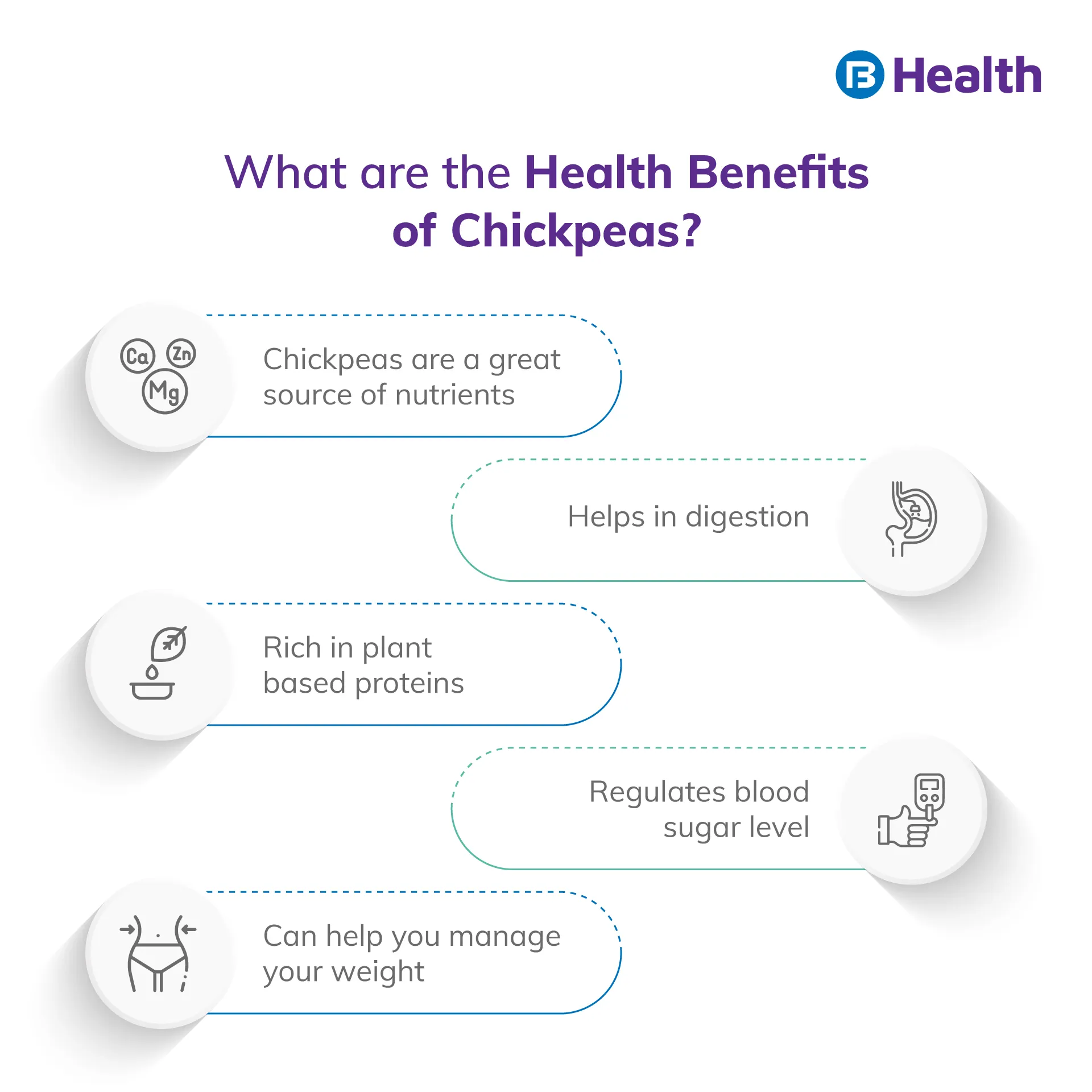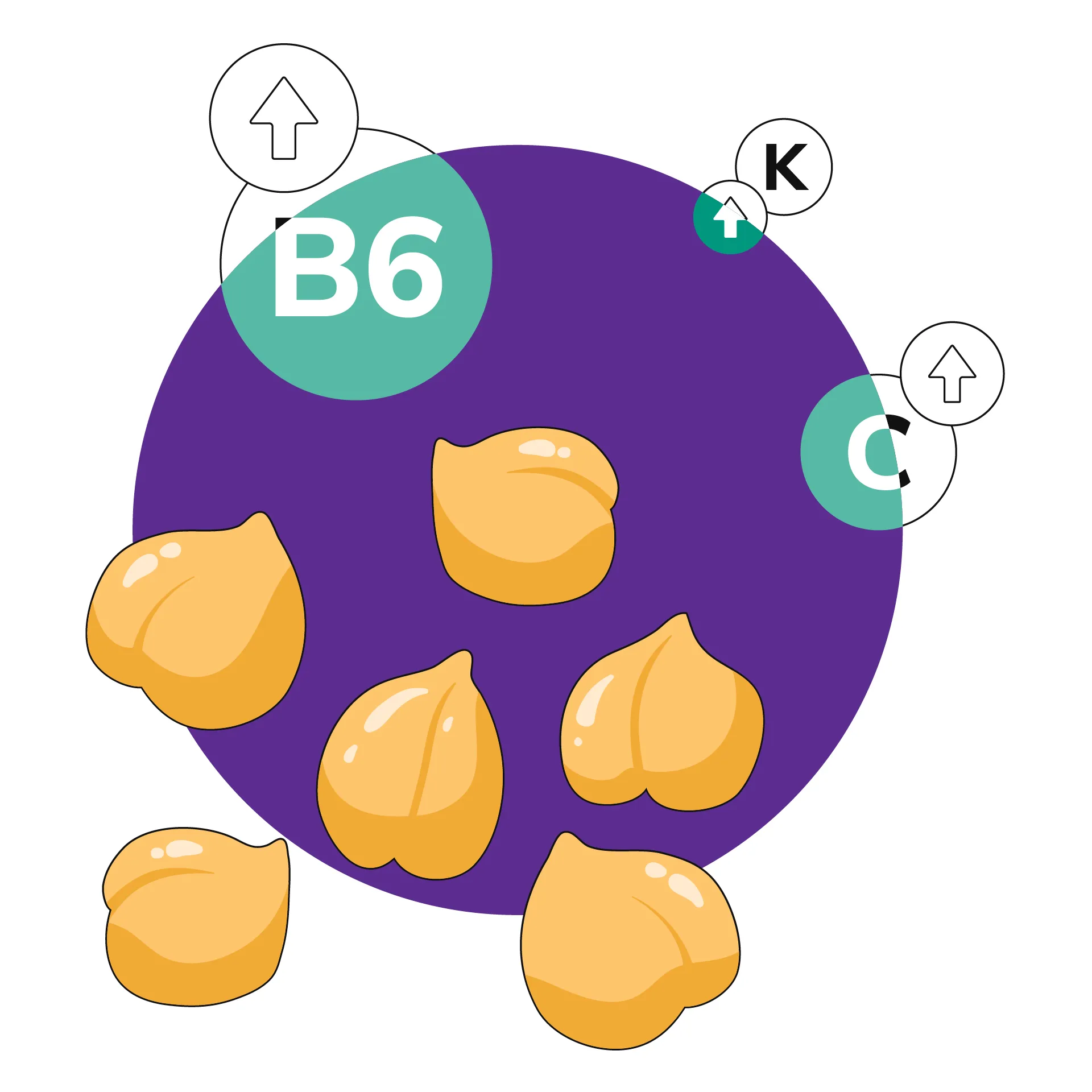Nutrition | 6 min read
Chickpeas: Health Benefits and Nutritional Value
Medically reviewed by
Table of Content
Synopsis
Chickpeas, also referred to as the garbanzo bean, are one of the first cultivated beans in history. Due to the high nutritional value of chickpeas, they are used as a great healthy addition to any meal. Some even consider chickpeas a superfood.
Key Takeaways
- The nutritional value of chickpeas is distinctive. Almost 67% of the chickpea's weight is made up of carbohydrates
- Chickpeas are incredibly high in folate, manganese, magnesium, and vitamins B6 and C
- There are 269 calories in one cup of chickpeas
Chickpeas provide a fair number of vitamins and minerals and a modest quantity of calories. They offer a decent amount of protein and fiber as well. Like Vitamin C Fruits, chickpeas benefits to maintain healthy skin and prevent diseases like cancer.
Chickpeas also aid with blood sugar regulation. Chickpeas in cans and dried form have a low glycemic index. This is because they are slowly digested and metabolised by your body. They also include amylose, a slow-digesting type of starch both help to avoid an excessive spike in blood sugar and insulin levels. This is beneficial to diabetic patients.
We've compiled a list of chickpeas benefits and nutrition trends to make your food more enjoyable and healthier.
What are Chickpeas?
Chickpeas are round and beige legumes, although there are also red, green, and black variations. Their nutrients provide several health advantages. The dry edible seeds inside the legumes pod are a form of a pulse.
Just like other legumes, chickpeas are a good source of fiber and protein. They also include several necessary vitamins and minerals.
Nutritional Value of Chickpeas
The nutritional value of chickpeas (dry and canned cooked chickpeas) could differ. One cup, or a dish, contains:
- Around 269 calories
- 4 grams of fat
- Carbs ranging from 34 to 45 grams (canned chickpeas are on the lower end)
- Fiber between 9 and 12 grams (cooked dried chickpeas are on the higher end)
- Sugar between 6 and 7 grams
- Ten to fifteen grams of protein (cooked dried chickpeas have more protein)
One cup of chickpeas contains the following vitamins and nutrients:
- Approximately 6 to 8% of your daily recommended calcium intake
- Around 40% of your daily fiber requirements
- You can meet 8% of your daily iron needs through dry-cooked chickpeas, and 22% of your daily needs through canned
- Approximately 70% of your folic acid, or folate, daily needs (for dried chickpeas; 15 percent for canned)
- About 39% of your daily phosphorus needs (for dried chickpeas; 17 percent for canned)

10 Health Benefits of Chickpeas
Chickpea benefits are listed as follows:
Blood Sugar Regulation
They aid with blood sugar regulation. Chickpeas in cans and dried form have a low glycemic index. As a result, they are slowly absorbed and digested by your body. Both work to stop blood sugar and insulin levels from rising too quickly. This is advantageous for diabetic patients.
Healthy Digestion
Chickpeas contain many dietary fibers, notably a soluble fiber called raffinose. This is broken down by the beneficial bacteria in your stomach so that your colon can gently absorb it. Studies show that eating more chickpeas may help you have easier, more regular bowel movements.
Lowering Cholesterol
Chickpeas could aid in lowering cholesterol. Chickpeas benefits of soluble fiber extend beyond gastrointestinal health. It can lower your LDL ('bad') and total cholesterol. Your risk of heart disease is decreased as a result. According to studies, regularly eating chickpeas lowers your total cholesterol. [1]
Reduces Risk of Cancer
They could reduce your chance of developing cancer. When you eat chickpeas, your body generates butyrate, a short-chain fatty acid. Butyrate has been proven in tests to aid in the elimination of diseased and dying cells. This might reduce your chance of developing colorectal cancer. Other cancer-preventive substances found in chickpeas include lycopene and saponins.
Encourages Heart Health
One half-cup serving of chickpeas has 16% of the daily recommended amount of fiber. Chickpeas include soluble fiber in around a third of their total fiber content, making them heart-healthy meals. According to studies, those who consume high-fiber diets often have a lower risk of developing heart disease. [2] So, choose good fruits for the heart.
Encourages Colon Health
Consuming foods high in resistant starch, such as chickpeas, can help maintain a healthy gut flora balance, which benefits the digestive tract.
Adverse Reactions
Chickpeas, like other beans, might result in gas-producing digestive symptoms, as can high-fiber diets. However, you may avoid these symptoms by gradually increasing the fiber in your diet.
Helps in Weight Management
You can feel fuller for longer and eat fewer calories overall by eating foods high in fiber and protein. [3]Studies comparing chickpeas to white bread showed that those who ate chickpeas had better glycemic control, reduced hunger, and consumed fewer calories.
Helps in promoting brain health
Choline, magnesium, selenium, and zinc are just a few minerals found in abundance in chickpeas that may help maintain brain function.
Helps in aiding Type 2 Diabetes
Chickpeas may aid in the prevention of various chronic conditions, such as type 2 diabetes, cancer, and heart disease.
Additional Read: Apricot Health Benefits
Chickpeas Allergies
Legumes include chickpeas, soybeans, and peanuts (both of which are top allergens). Chickpea allergy is typically detected as a cross-reaction in people who have already been allergic to soy, peas, lentils, or hazelnuts.
If you are allergic to any of these foods, particularly peas or lentils, or if you become sick after eating chickpeas, get a doctor consultation immediately about your diet to find out what is safe for you.
How to Prepare Chickpeas
- Dried chickpeas should be soaked before cooking. There are various chickpea recipes, and here are a few for you: Pick through the package and take out any dirt, rocks, or other objects
- Remove any skins or other objects that float to the top after adding beans to a dish and cover them with cold water
- Beans should be drained in a strainer and then rinsed with cold water
- Place the beans on a plate and top with three cups of brand-new, ice-cold water for each cup of beans
- Soak the beans overnight
- Drain the beans through a strainer before using them, then throw away the water
Alternately, use a rapid soaking technique to save time:
- Pick through and rinse the beans
- Put the beans in a pot with only 2 inches of cold water to cover them
- Let the water boil, then let it simmer for two minutes
- Take the heat off, cover, and soak for approximately an hour
- Before using, drain the beans and discard the water
Remember that 3/4 cups of cooked beans come from around 1/4 cup of dry beans. So drain and rinse the beans if you're using canned ones.
Chickpeas can be added to salads, stews, soups, chilis, casseroles, greens, or grain meals. Hummus is created by combining tahini and pureed chickpeas. For a protein and fiber-rich snack, use hummus as a vegetable dip, or use it in place of high-fat dressings like mayonnaise when creating chicken or tuna salad. If you are looking for more such high-protein snacks, you can try the candida diet.
Additional Read: World Egg Day: What are the Healthiest Ways to Cook Eggs?Chickpeas Health Risks
People should avoid eating raw pulses, such as chickpeas, because they may contain difficult-to-digest substances. Even cooked chickpeas contain complex carbohydrates that can be challenging to digest and cause bloating and pain in the intestines. Legumes should be gradually included in a person's diet to let their body adjust.
Chickpeas are a great source of nutrients the body needs for proper growth and development. Even though eating chickpeas has numerous health benefits, it is essential to introduce them slowly into your diet. To read more such articles, visit Bajaj Finserv Health.
References
- https://www.ncbi.nlm.nih.gov/pmc/articles/PMC5188421/
- https://www.ncbi.nlm.nih.gov/pmc/articles/PMC5731843/
- https://www.livofy.com/health/weight-loss/chickpeas-nutritional-importance-and-health-benefits/
Disclaimer
Please note that this article is solely meant for informational purposes and Bajaj Finserv Health Limited (“BFHL”) does not shoulder any responsibility of the views/advice/information expressed/given by the writer/reviewer/originator. This article should not be considered as a substitute for any medical advice, diagnosis or treatment. Always consult with your trusted physician/qualified healthcare professional to evaluate your medical condition. The above article has been reviewed by a qualified doctor and BFHL is not responsible for any damages for any information or services provided by any third party.




